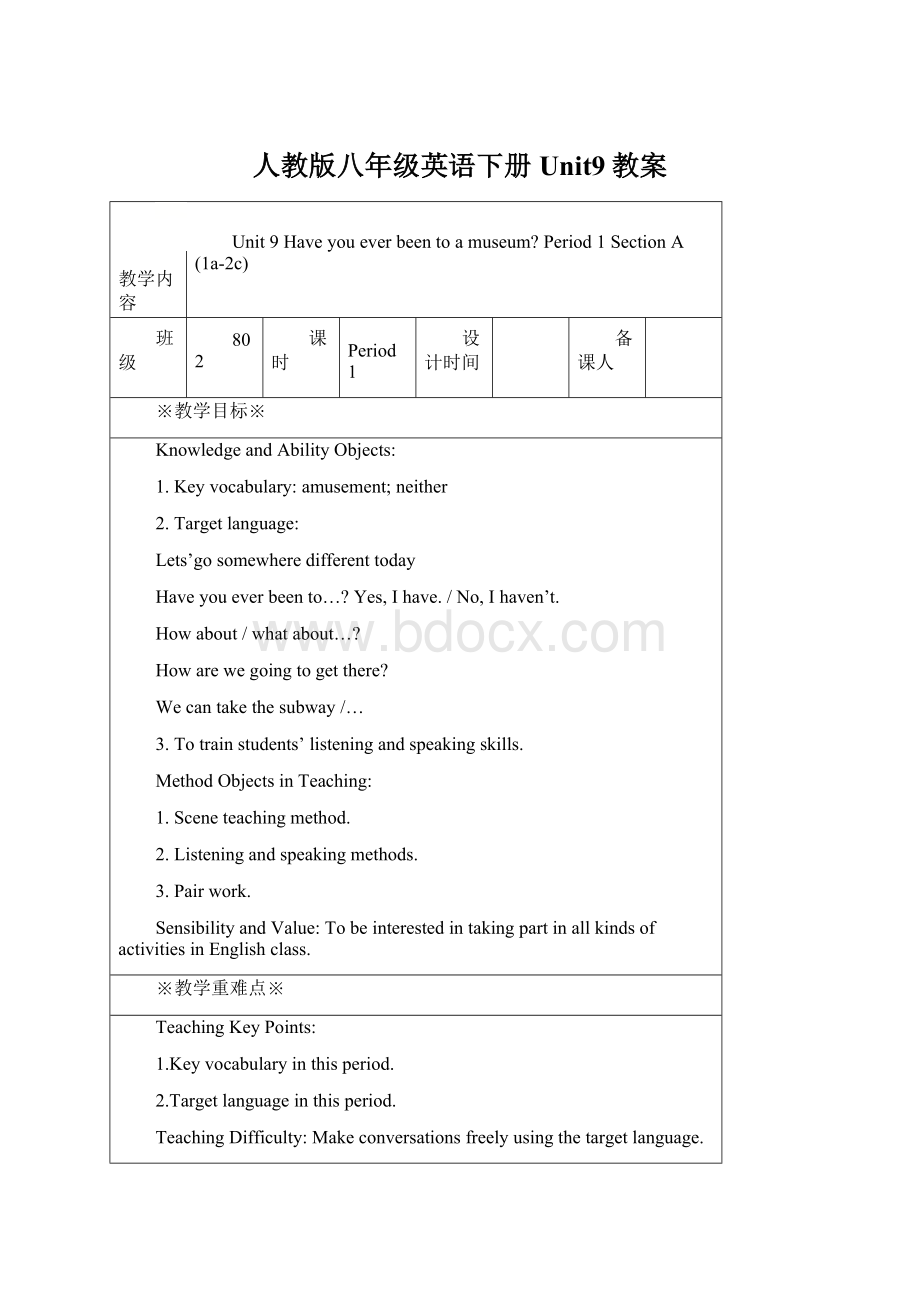人教版八年级英语下册Unit9教案.docx
《人教版八年级英语下册Unit9教案.docx》由会员分享,可在线阅读,更多相关《人教版八年级英语下册Unit9教案.docx(17页珍藏版)》请在冰豆网上搜索。

人教版八年级英语下册Unit9教案
教学内容
Unit9Haveyoueverbeentoamuseum?
Period1SectionA(1a-2c)
班级
802
课时
Period1
设计时间
备课人
※教学目标※
KnowledgeandAbilityObjects:
1.Keyvocabulary:
amusement;neither
2.Targetlanguage:
Lets’gosomewheredifferenttoday
Haveyoueverbeento…?
Yes,Ihave./No,Ihaven’t.
Howabout/whatabout…?
Howarewegoingtogetthere?
Wecantakethesubway/…
3.Totrainstudents’listeningandspeakingskills.
MethodObjectsinTeaching:
1.Sceneteachingmethod.
2.Listeningandspeakingmethods.
3.Pairwork.
SensibilityandValue:
TobeinterestedintakingpartinallkindsofactivitiesinEnglishclass.
※教学重难点※
TeachingKeyPoints:
1.Keyvocabularyinthisperiod.
2.Targetlanguageinthisperiod.
TeachingDifficulty:
Makeconversationsfreelyusingthetargetlanguage.
※教学准备※
TeachingAids:
1.Ataperecorder.
2.Acomputerformultimediause.
※教学过程设计※
Step1GreetingsandRevision
Greettheclassandcheckthehomework.
Step2Lead-in
1.Guesstheplacesofthepictures:
theyareartmuseum,spacemuseum,historymuseum,waterpark,zoo,amusementparkwhileleadinsentencepatterns:
“Haveyoueverbeento…?
”
2.Getstudentstoworkinpairstopracticetheconversation.
A:
Haveyoueverbeento…
B:
Yes,Ihave/Not,Ihaven’t.
Step3Pre-listening
1.(1a)Readthenamesoftheseplaces.Whichoftheseplaceswouldyouliketovisit?
Rankthemfrom1to5.
2.Talkaboutthepicture.
Step4Listening
1.(1b)Listenandchecktheboxes.Havethesestudentseverbeentotheseplaces?
2.Checktheanswers.
Step5Practice
1.(1c)Inpairs,askandanswerquestionsabouttheplacesin1b.
2.Asksomepairstoshowtheirconversations.
Step6Listening(2a,2b)
1.Lookatthemapofthetown.Listenandcircletheplacesthatyouhear.
2.ListenagainandcircleTfortrueorFforfalse.
3.Checktheanswers.
Step7Practice(2c)
1.Lookatthemapin2aandmakeconversationsabouttheplaces.
2.Asksomepairstoshowtheirconversationstotheclass.
Step8Homework
Practicethedialogueandrememberthelanguagepoints.
2.Previewthenextlesson.
※板书设计※
Unit9Haveyoueverbeentoamuseum?
Period1SectionA(1a-2c)
spacemuseumHaveyoueverbeentoanamusementpark?
amusementparkYes,Ihave./No,Ihaven’t.
aquarium
zoo
waterpark
※教学反思※
教学内容
Unit9Haveyoueverbeentoamuseum?
Period2SectionA(2d-3c)
班级
802
课时
Period2
设计时间
备课人
※教学目标※
KnowledgeandAbilityObjects:
1.Keyvocabulary:
unbelievable,progress,rapid,unusual,toilet,encourage,social,peaceful,performance,
perfect,itself,collect
2.Targetlanguage:
1)Iwonderhowmuchmorecomputerwillbeabletodointhefuture.
2)Watchingthempreparetheteawiththebeautifulteasetsisjustasenjoyableasdrinkingtheteaitself.
3.Totrainstudents’readingability.
4.Togetstudentsknowsomeknowledgeaboutmanykindsofmuseums.
MethodObjectsinTeaching:
1.Skimmingfordetails.
2.Readingforcomprehension.
3.Communicativeapproach.
SensibilityandValue:
Toraisestudents’interestoflearningEnglish.
※教学重难点※
TeachingKeyPoints:
1.Keyvocabulary2.Targetlanguage:
TeachingDifficulties
1.Howtoimprovereadingskill.2.Tounderstandthepassageandtheculture.
※教学准备※
TeachingAids:
1.Ataperecorder.2.Acomputerformultimediause.
※教学过程设计※
Step1GreetingsandRevision
A:
Haveyoueverbeento…?
B:
Yes,Ihave./No,Ihaven’t.
Step2Practice
1.Role-playtheconversationin2d.
A:
Iwenttothefilmmuseumlastweekend.Haveyoueverbeenthere?
…
B:
Yes,Ihave.IwenttherebackinApril.
A:
…
Step3Languagepoints
1.Ilearnedabouttheinventionsthatledtocolormovies,too.
此处learn是“了解;获知;得知”的意思,由介词about或of引入所获知的具体内容。
如:
Thechildrenwereallshockedtolearnofthedeathoftheirheadmaster.
Ionlylearnedabouttheaccidentlater.
2.I’veneverbeencamping.
此句为现在完成进行时。
这一时态的结构为“havebeen+现在分词”,表示从过去某一时刻延续至今的动作。
在本句中,说话人使用这一时态来强调自己至今从未有过野营的经历,欠缺这方面的经验。
如:
He’sbeenwatchingTVallafternoon.
We’vebeenlivinglikethiseversincethebirthofmylittlebrother.
Step4Pre-reading
1.Brainstorm:
thinkofthekindsofmuseumsthatyoucanname.
2.WatchavideoabouttheInternationalMuseumofToilets.
3.Talkaboutthevideo.
Step5Fastreading
Readthepassagequicklyandanswerthefollowingquestions.(3a)
1.Whichthreemuseumsdothestudentstalkabout?
2.Whatdoyouthinkisthemostinterestingthingabouteachmuseum?
Step6Detailedreading
1.Readthepassagecarefullyandanswerthequestions.(3b)
WhatdoesKensayabouttheAmericanComputerMuseum?
WhatcanwelearnattheInternationalMuseumofToilets?
WhyistheHangzhouNationalTeaMuseumaniceplacetoenjoytea?
2.ReadthepassageandcheckTrueorFalse.
()1.AmericanComputerMuseumonlyhasinformationaboutdifferentcomputersthere.
()2.Kenthinkscomputerswilldomoreworkinthefuture.
()3.InternationalMuseumofToiletsisaveryunusualmuseum.
()4.Indiahasthemostadvancedtoilet.
()5.Linlindidn’tknowwhyhergrandpaloveddrinkingandcollectingteaset.
3.(3c)Whichoftheunderlinedwordsinthepassagehavethefollowingmeanings?
makesth.betterbecomebetteruncommonquietmadequick
Step7Explanation
1.Theoldcomputersweremuchbigger.
much,alittle,even,abit可修饰形容词比较级。
如:
muchricher
2.Iwonderhowmuchmorecomputerwillbeabletodointhefuture.
wonder表示“(对某事)感到疑惑;想要知道;想弄明白;琢磨”,后面常接由what,how,who或者if/
whether引导的宾语从句。
如:
Iwonderhowthey’regettingon.
Ijustwonderifthey’vearrivedsafely.
3.Italsoencouragesgovernmentsandsocialgroupstothinkaboutwaysto…
encouragesb.todosth.鼓励某人做某事
e.g.Myfatherencouragedmetotakepartinthesportsmeeting.
4.Watchingtheteapreparationisjustasenjoyableasdrinkingtheteaitself.
enjoyable“能使人快乐的;令人愉快的”如:
drinkable(可饮用的),washable(可洗的),readable(可读的),usable(可用的;可使用的)等等。
Step8Homework
1.Rememberthewordsandexpressions.
2.Talkaboutthemuseumssyouhaveeverbeento.
※板书设计※
Unit9Haveyoueverbeentoamuseum?
Period2SectionA(2d-3c)
Newwords:
unbelievable,progress,rapid,unusual,toilet,encourage,social,peaceful,performance,perfect,itself,collect
Sentences:
1.Iwonderhowmuchmorecomputerwillbeabletodointhefuture.
2.Watchingthempreparetheteawiththebeautifulteasetsisjustasenjoyableasdrinkingtheteaitself.
※教学反思※
教学内容
Unit9Haveyoueverbeentoamuseum?
Period3SectionA(Grammar-4c)
班级
802
课时
Period3
设计时间
备课人
※教学目标※
KnowledgeandAbilityObjects:
1.Targetlanguage:
Haveyoueverbeentoasciencemuseum?
Yes,I’vebeentoasciencemuseum./No,I’veneverbeentoasciencemuseum.
Haveyouevervisitedthespacemuseum?
Yes,Ihave.Iwenttherelastyear./No,Ihaven’t.
I’vebeentotheartmuseummanytimes.
Me,too.AndI’vealsovisitedthenaturemuseum.
2.BeabletounderstandtheGrammarFocus.
MethodObjectsinTeaching:
Explanationmethod;Exercisemethods.
※教学重难点※
TeachingKeyPoints:
1.Thepresentperfecttense.2.Howtousethepresentperfecttense.
TeachingDifficulties:
Tounderstandandusethepresentperfecttense.
※教学准备※
TeachingAids:
1.Acomputerformultimediause.2.Apicture.
※教学过程设计※
Step1GreetingsandRevision
1.Greettheclassasusualandcheckthehomework.
2.AskstudentstoreadthesentencesofGrammarfocusaloud.
Step2LearnthePresentPerfectTense
1.用法:
1)表示过去发生或已经完成的动作对现在造成的影响或结果。
2)某些动词的现在完成时可表示过去某一时间开始并一直持续到现在(包括现在)的动作或者状态,可以和表示延续的时间状语连用。
表示持续动作或状态的是延续性动词。
2.构成:
have/has+p.p.
havenot=haven’thasnot=hasn’t
3.havebeento&havegoneto区别
have/hasbeen(to)表示“曾经到过某地”,说话时此人不在那里,已经回来。
侧重指经历。
have/hasgone(to)表示某人“已经去某地了”,说话时此人可能在路上或已到那里,反正不在这里。
4.一般过去时与现在完成时的区别
比较:
Ihaveseenthefilm.我看过这部电影。
(我了解这部电影的内容)
Isawthefilmlastmonth.我上个月看了这部电影。
(只说明上星期看了这部电影,不涉及现在情况)
一般过去时的时间状语有:
yesterday,lastweek,…ago,in1980,inOctober,justnow…
共同的时间状语有:
thismorning,tonight,thissummer,before,already,...
现在完成时的时间状语有:
for,since,ever,never,just,already,yet,inpastyears,…
Step3Exercises
1.Finish4aontextbook.Putthecorrectformoftheverbsintheblanks.
2.Finish4bontextbook.Fillintheblankswiththecorrectformsoftheverbsinbrackets.
3.Finish4contextbook.Answerthesurveyquestionsandthenaskyourpartner.
4.Askstudentstodotheewxercises,thenchecktheanswers.
Step4Summary
SummarizeWhatwelearntinthisclass.
Step5Homework
Domoreexercisesafterclass.
※板书设计※
Unit9Haveyoueverbeentoamuseum?
Period3SectionA(Grammar-4c)
A:
Haveyoueverbeentoasciencemuseum?
B:
Yes,I’vebeentoasciencemuseum./No,I’veneverbeentoasciencemuseum.
A:
Haveyouevervisitedthespacemuseum?
B:
Yes,Ihave.Iwenttherelastyear./No,Ihaven’t.
A:
I’vebeentotheartmuseummanytimes.
B:
Me,too.AndI’vealsovisitedthenaturemuseum.
※教学反思※
教学内容
Unit9Haveyoueverbeentoamuseum?
Period4SectionB(1a-1d)
班级
802
课时
Period4
设计时间
备课人
※教学目标※
KnowledgeandAbilityObjects:
1.Keyvocabulary:
theTerracottaArmy,theGreatWall,theBird’sNest,thePalaceMuseum
2.Targetlanguage:
Haveyouvisited…?
Haveyoubeento…?
Haveyouseen…?
Haveyoutried…?
3.Totrainstudents’listeningandspeakingskills.
MethodObjectsinTeaching:
1.Listeningandspeakingmethods.
2.Practicemethod.
SensibilityandValue:
Toraisestudents’interestoflearningEnglish.
※教学重难点※
TeachingKeyPoints:
1.Keyvocabularyinthisperiod.
2.Targetlanguageinthisperiod.
TeachingDifficulties:
Improvestudents’listening.
※教学准备※
TeachingAids:
1.Acomputerformultimediause.2.Atapereco